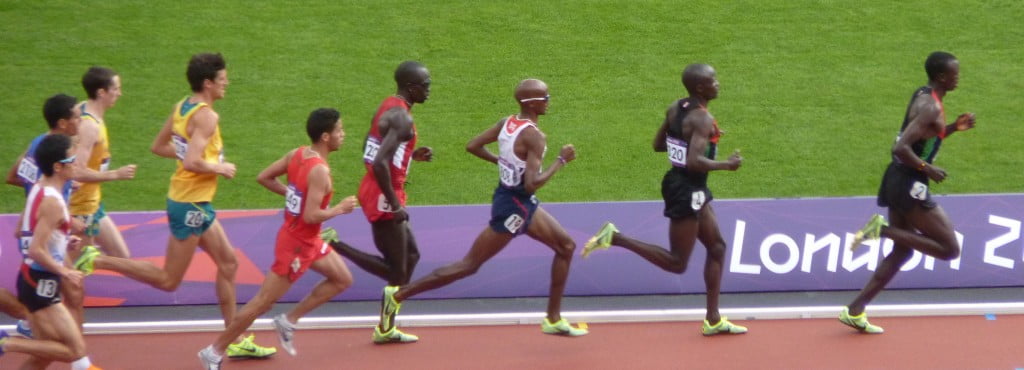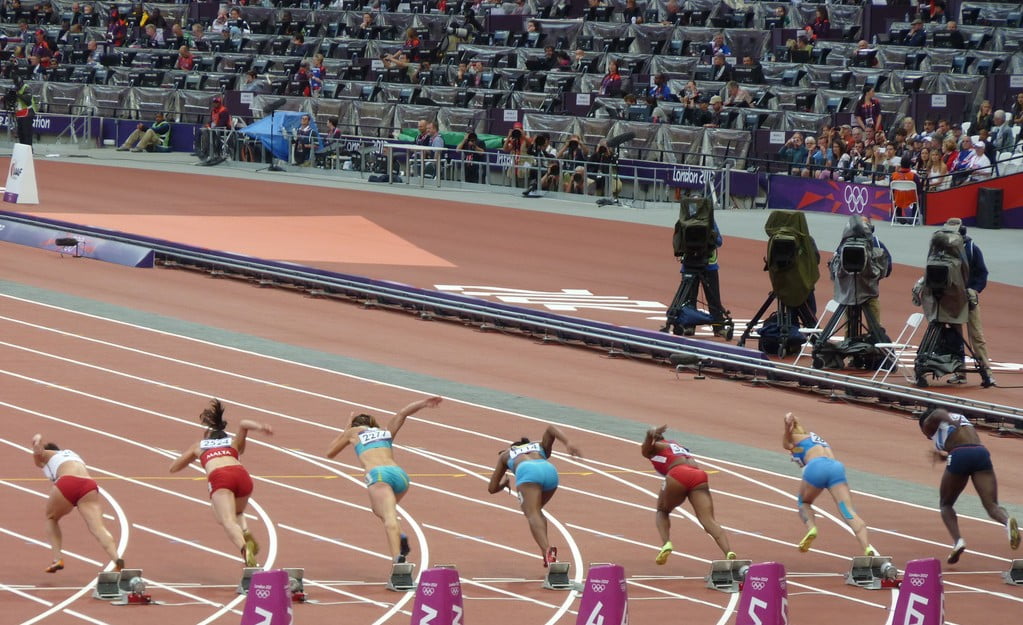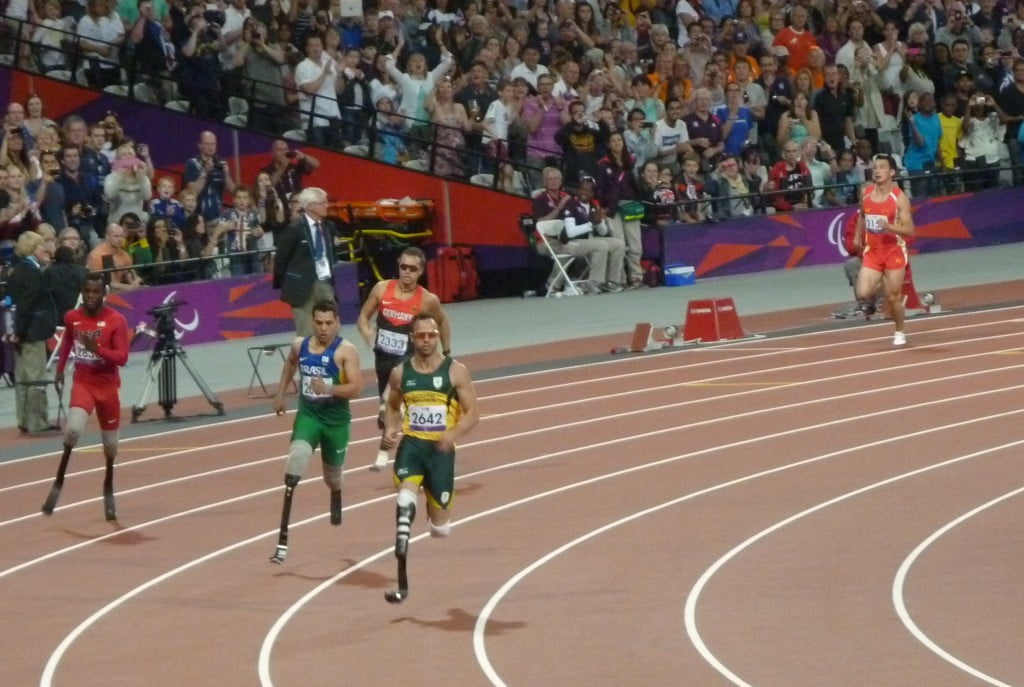
I’ve been dreaming of going to the Olympic Games since I was eleven. The 1972 Games were such a thrill, not only for the sports themselves, but for the discovery of Olympic history. My heroes were the Olympians of years past: Ray Ewry, Jim Thorpe, Paavo Nurmi, Jesse Owens, Wilma Rudolph, Abebe Bikila. I also loved all of the statistics, the minutiae of records, and the moral knots into which the Olympic movement so often tied itself.
The Games thereafter took place in lands far away, though I came close to going to Sydney in 2000 (I bought a house instead). Then came the London bid, faltering at first, but increasingly confident as we saw those imaginative posters showing athletes leaping over London landmarks. Excitement was not exactly at fever pich (that’s not the British way), but through the final negotiations in Singapore you sensed that an amazing coup was on the way. And then that wonderful day when London won the Games, and I started making plans. Then came 7/7, and the Olympic Games seemed both utterly unimportant and at the same time more important than anything. A triumphant Games would mean a victory over everything.
The Olympic torch comes to my home town of Rochester
Seven years on, and after the tortuous process of getting tickets (I failed to get anything in the first ballot), then the torch relay succeeding in making it a Games for everyone not just Londoners, then the ringing of bells on the morning of the first day, then the brilliance and the passion of Danny Boyle’s opening ceremony, we could begin.
I was lucky enough to see so much of London 2012: I saw three athletics sessions, a men’s handball quarter-final, a men’s football semi-final (Mexico v Japan), table tennis, cycling time trials and the men’s marathon for the Olympics, and the final evening of athletics at the Paralympics. I saw Jessica Ennis, Mo Farah, Oscar Pistorious, and a blur that was reported to be Bradley Wiggins. I saw the amazing decathlete Ashton Eaton, hardly reported on in the UK but a huge news story in the USA, and I scaled the Orbit (handily getting to see a couple of men’s semi-final hurdles while up there by looking down into the stadium below). When not at the Games themselves, my every waking hour was spent in front of a screen, channel-hopping and sport-hopping, exhilarated by the excellence and the purity of it all. It was the best of times.

While at the Olympic Games, I was as interested in the crowds and the organisation of it all (the wondeful Games Makers) as I was in the sports themselves. I was especially interested in seeing how the Games were filmed. The BBC has been rightly praised for its multi-platform broadcast coverage, but the acclaim for the actual filming is a little misplaced, since the greater part of it was done by Olympic Broadcasting Services, an IOC offshoot contracted to provide footage to broadcasters around the world. The BBC obviously filmed its presenters and inserts, and it had cameras trained on individual athletes, but the greater part of the filming was done by OBS.
OBS camera operators were everywhere, distinguishable by their grey tabards. The half or dozen or so that I saw filming the table tennis looked almost half asleep, so routine was the work they were doing, with every camera angle pre-planned with the greatest care, but the results were highly professional and mixed onsite with great agility. I did think that some of the resultant television footage tended towards the efficient rather than the brilliant (with some notable exceptions, such as the thrilling shots from the archery of arrows in flight). Previous Games have been an opportunity for host broadcasters to innovate in how sports can be filmed. London 2012 instead saw great innovation in how video content can be distributed, for which the BBC deserves all the plaudits going.
In the stadium itself there were camera operators trackside, in serried ranks overlooking the finishing line, and automatic cameras on rails, poles and wires for superbly executed tracking shots. Cameramen (I never saw a camerawoman) patrolled the crowds looking for shots of the enthusiastic and colourful. There were motorbike drivers of immense skill carrying cameramen with absolute steadiness while never running into anything or impeding any cyclist or runner out on the roads. And then there were the operators with gyroscopically-balanced cameras following individual athletes after any particular triumph, or in the case of someone like Jessica Ennis for the entire time they were in the stadium. I gained huge admiration for Ennis’ steady calm under pressure, not only being pursued by cameras wherever she went, but having stadium announcer continually praise her and then conduct an interview on the big screen with someone discussing her chances. I wondered how anyone could keep focus under such unrelenting circumstances. As we all know, she did.
We take part in a Mexican wave at the Olympic stadium
When London was awarded the Games in 2005, part of my plans were to take my nephew (then aged three) to the Games, so he would see at first-hand what had been so exciting for me at the same age. We ended up going twice to the Olympic Games, and once to the Paralympic Games, each time to the Olympic Stadium itself. Though I don’t think he is quite as fascinated by sport as I was at his age (without being in the least bit athletic myself) he enjoyed the whole occasion hugely, with the Orbit and the Mexican waves in the stadium being particular highlights. Sports commentators tend to sneer at Mexican waves – evidence, it is said, of a bored crowd not able to follow sport properly. But sport is the crowd, and the crowd is integral to the entertainment, and Mexican waves are a joyous form of demonstrating that we are sharing in the spectacle along with everyone else.

And finally there was the Paralympics. No one thought about the Paralympic Games as part of the package back in 2005, and despite Channel 4’s earnest build-up to the Games, promoting its exclusive coverage, I think few gave it much mind except as an interesting add-on to the Olympics and an opportunity to see the Olympic Park and Stadium if you had missed them the first time round.
As the Paralympics started it seemed that the crowd were loving it (not least because of the opportunity for flag-waving with all the British successes) but the mass TV audience of the Olympics had fallen away. Then everyone began to catch on. This was something extraodinary. We were living in a different world, where the so-called disabled were more able than the rest of us. Children, it’s said, watched the Games then went out to play at being minus a limb, or sight, or whatever, and achieving excellence that way. We were euphoric all over again. They were extraordinary times.
Now the skies are grey, the stadia are empty, and the medals have been put away. My collection of newspaper coverage, tickets, programmes and memorabilia can now begin to fade. The video archives will be visited gradually less and less. The commemorative books and programmes will come out and remind us of the wonders that were, but they are memories only, not the time itself, when for a few weeks the world actually was a better place. Extraordinary times indeed.
Links
- My blog post, Pandaemonium and the Isles of Wonder, attempts to explain the inspiration behind Danny Boyle’s opening ceremony
- My photographs of London 2012 are available as a set on Flickr